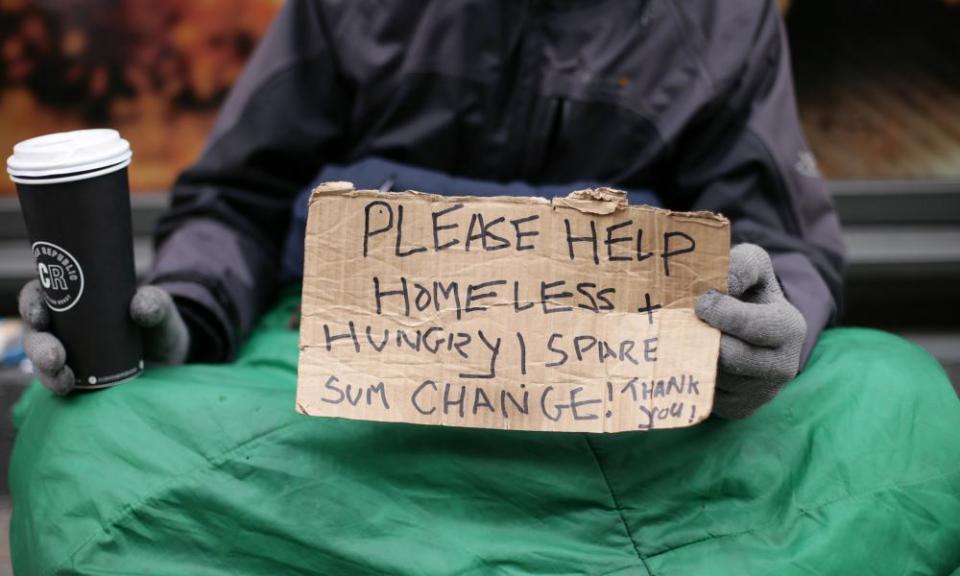They say Labour is financially inept. Yet just look at Tory welfare spending | Frances Ryan

One of the greatest falsehoods of modern British politics is that the public purse is safe in Conservative hands. As George Osborne slopes off from public office, he leaves the stain of a government that imposed a decade of gruelling austerity in the name of “deficit reduction”, all for nought, as he missed his own targets again and again.
And yet, going into this election, it is Labour – the party that oversaw repeated growth and reduced debt – that carries the reputation of fiscal ineptitude.
The 2015 general election, in many ways, became the apex of a conversation that has played out since the last Labour government. The Conservatives ram home the myth that the British economy was wrecked not by bankers or a global crash but by Labour “overspending” – and Labour fails to defend its record.
Two years on, the political climate and several of its key players are much changed, but with Labour trying to push public services on to the agenda, and the fresh uncertainty of Brexit, the issue of financial responsibility is as pressing as ever.
As Theresa May and ministers paint a Corbyn victory as one of chaos and risk, now is the time for Labour to not only cast itself as a capable pair of hands but relentlessly jab at the Tory’s blustering incompetence.
Few things demonstrate this more than the Conservative’s record on welfare spending – an area they have long claimed as their territory but in which they are in fact overseeing a culture of inept waste. Just look at disability benefits. We’re told repeatedly that spending on “welfare” for disabled people is out of control, yet the Department for Work and Pensions has gone nearly £200m over budget in what it is paying two private firms to run the personal independence payments assessment system. The Conservatives have now spent £700m in taxpayers’ money on these contracts alone, despite the fact the process is so flawed that four out of five rejection decisions are overturned at appeal.
Or consider the government’s flagship benefit reform, universal credit (UC): five years behind schedule, with delays announced seven times, and a price tag rising to a staggering £16bn. And with all that public money, it’s still being plagued by administrative chaos and design flaws – to the extent that it’s not only failing in its purpose of improving the benefit system but is actively creating more social and economic problems.
The Trussell Trust found this week that UC’s much criticised six-week waiting period has led to mass emergency food parcels. In areas where the full universal credit rollout has taken place, food bank referral rates are now running at more than double the national average. This is on top of the debt, rent arrears and evictions UC is also causing.
When families lose their homes because of government policy, where do they go? Increasingly, to emergency accommodation – paid for by the public purse. While the Conservatives talk of bringing down the housing bill, councils have had to spend more than £3.5bn on temporary accommodation for homeless families in the last five years. That bill has
rocketed by 43% annually under Conservative leadership.
The government’s handling of housing is a lesson in inefficiency: it fails to build affordable housing, and initiates a range of housing benefit cuts that push families into rent arrears, and then throws taxpayers’ money at extortionate bed and breakfasts and hostels, in the process lining the pockets of private landlords. It’s similar unsound thinking that sees the Conservatives cut funding for welfare advice centres and debt services – in essence, the safety net that helps struggling people keep their homes – and then have to spend £500m to try to mop up the homelessness it helped create.
The impact of flawed Conservative spending tactics goes beyond housing or benefits to every street in every neighbourhood: it emerged this week that the government’s decision to pull £3bn from local services over the past five years means councils are now unable to fund many services, from street cleaning to road safety.
As well as overflowing hospitals, cold schools, and shut libraries, Tory spending choices mean even the most basic provisions, such as food and water safety inspection, road school crossings and CCTV crime prevention, are now crumbling. Imagine the reaction if this was happening under a Labour government. The Sun would be mocking up images of streets drowning in rubbish and rotting debris, while the Mail would carry stories predicting school accidents and pensioner muggings.
The left, quite correctly, talks of the human cost of Conservative policy, but it’s hammering the Tories on the financial costs that will hit them where it really hurts. In any case, whether it’s a council paying to keep a young family in a B&B because they’ve lost their home after benefit delays, or a cancer patient put through the costly tribunal system after being wrongly found “fit for work”, morality and economics are not neatly separate concepts.
That the government has spent years arguing there isn’t enough money to properly fund public services or the benefit safety net only makes their flawed spending choices more disgraceful. This election, Labour can say it with confidence: the Conservatives are the party of incompetence.

 Yahoo News
Yahoo News 